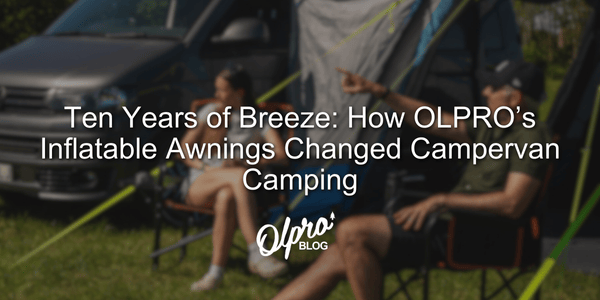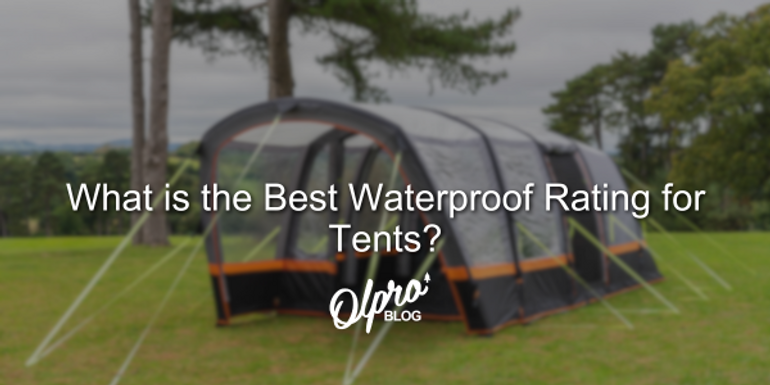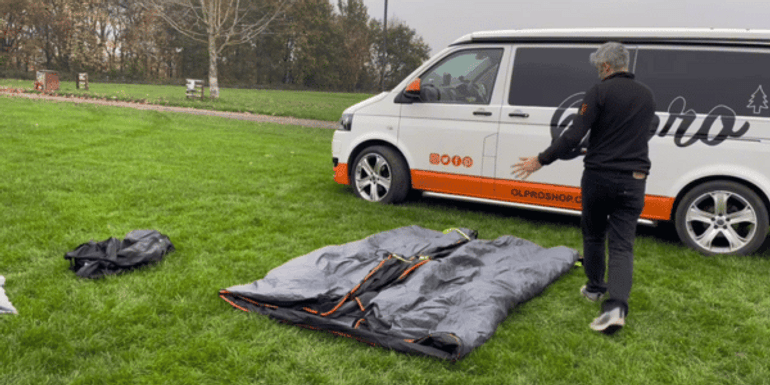Ten Years of Breeze: How OLPRO’s Inflatable Awnings Changed Campervan Camping
Posted by Katie Martin on 11th Dec 2025
SHARE THIS
Ten Years of Breeze: How OLPRO’s Inflatable Awnings Changed Campervan Camping
When we first sketched out ideas for OLPRO back in 2011, we always knew we wanted to do things differently. We didn’t just want another tent. We didn’t just want another campervan awning. We wanted bold, stand-out design, easier pitching, and proper innovation that actually made camp
…
read more
read more
What is the Best Waterproof Rating for Tents?
Posted by Daniel Walton on 17th Nov 2025
SHARE THIS
What Is the Best Waterproof Rating for Tents?
Key Takeaways
A tent's waterproof rating, or Hydrostatic Head (HH), measures how much water pressure (in mm) the fabric can resist before it leaks.
A 2,000-3,000mm rating handles light summer showers. For typical, unpredictable UK family camping, you need a 5,000mm rating for reliable protection.
A high HH rating is vital, bu
…
read more
read more
Camping Gifts for Him & Her: The Ultimate Guide for Outdoor Lovers
Posted by Gareth Walton on 11th Nov 2025
SHARE THIS
Camping Gifts for Him & Her: The Ultimate Guide for Outdoor Lovers
If you’re searching for the best camping gifts for someone who loves the outdoors, you’re in the right place. Whether you need camping gifts for men, camping gifts for women, or thoughtful gifts for camping lovers, OLPRO has a wide range of innovative and practical outdoor essentials to suit ever
…
read more
read more
OLPRO's Great Summer Escapes
Posted by Gareth Walton on 29th May 2025
SHARE THIS
OLPRO's Great Summer Escapes
As the British summer rolls in, there's no better time to gear up for your next big camping adventure. Whether you're planning a family getaway, a solo retreat into nature, or a group camping trip with friends, now is the perfect moment to check over your existing kit and treat yourself to some upgrades. A well-prepared camper is a happy camper, and
…
read more
read more
Our Favourite Campsites in the Lake District
Posted by Lisa Walton on 21st May 2025
SHARE THIS
Best Campsites in The Lake District
The Lake District is one of the UK’s most iconic natural landscapes, drawing millions of visitors each year to its serene lakes, dramatic mountain ranges, and endless walking trails. Whether you're a seasoned hiker looking for your next adventure, a family seeking fresh air and fun, or a couple wanting to reconnect under the stars, the
…
read more
read more
How to Pack Down Your Awning Quickly and Neatly
Posted by Gareth Walton on 15th May 2025
SHARE THIS
How to Pack Down Your Awning Quickly and Tidy Every Time
The trip’s over, rain’s starting… and you need to pack up fast. You’ve had a great time at the campsite, but now comes the bit every camper dreads: packing down the awning. It’s muddy, it’s wet, and the clock is ticking before the next downpour hits.
Sound familiar? You’re not al
…
read more
read more


 Euro
Euro
 Swedish Krona
Swedish Krona
 Danish Krone
Danish Krone
 Norwegian Krone
Norwegian Krone





